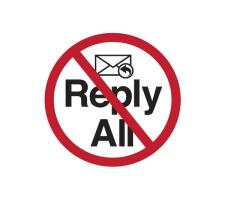“Reply to All” Is An Ethical Booby-Trap
 Here’s yet another reason to fear the dreaded “Reply to All” email button.
Here’s yet another reason to fear the dreaded “Reply to All” email button.
Clicking it might be unethical.
That’s the upshot of a new ethics ruling from the N.C. State Bar. 2012 FEO 7 says you can’t send a copy of an email to a represented party without the express consent of that party’s attorney. This is so even if the other attorney started it – by sending you the initial email and copying their client.
The basis for the opinion is Rule 4.2(a) – sometimes called the no-contact rule – which requires lawyers to keep their hands off clients known to be represented by counsel.
This applies to email, snail mail and other communications. The fact that an opposing lawyer sends you an email and copies their own client does not constitute implied consent to a “reply to all” response from you.
According to 2012 FEO 7:
Rule 4.2 contributes to the proper functioning of the legal system by “protecting a person who has chosen to be represented by a lawyer in a matter against possible overreaching by other lawyers who are participating in the matter, interference by those lawyers with the client-lawyer relationship, and the uncounselled disclosure of information relating to the representation.”
Comment [8] to Rule 4.2 provides that the rule “applies even though the represented person initiates or consents to the communication.”
The protections of Rule 4.2 are so important, the State Bar said, that they cannot be waived by the client.
Other states – notably New York and California – have considered the application of Rule 4.2 to email communications and reached different conclusions. In both of those states, the ethics authorities have concluded that consent to “reply to all” communications may sometimes be inferred from the facts and circumstances of any specific situation. See: Ass’n of the Bar of the City of NY Comm. on Prof’l and Judicial Ethics, Formal Op. 2009-1; CA. Standing Comm. on Prof’l Responsibility & Conduct, Formal Op. 2011-181.
But both rulings sound cautionary warnings.
The New York opinion says a lawyer who relies on implied consent “runs the risk that the represented person’s lawyer has not consented to the direct communication” and that to avoid any possibility of running afoul of the no-contact rule, “the prudent course is to secure express consent.” The California opinion says it is not appropriate for lawyers to “stretch improperly to find implied consent” and that even where consent may be implied, the better practice is to expressly confirm it in writing.
So be careful to check the “cc” and “recipient” lines on incoming emails – and text messages too, for that matter. Make sure you reply only to opposing counsel. Otherwise, you might be clicking on a State Bar grievance.
Jay Reeves a/k/a The Risk Man is an attorney licensed in North Carolina and South Carolina. Formerly he was Legal Editor at Lawyers Weekly and Risk Manager at Lawyers Mutual. He enjoys mowing his lawn. Contact jay.reeves@ymail.com, phone 919-619-2441.
Source: N.C. State Bar 2012 FEO 7 http://www.ncbar.com/ethics/propeth.asp



